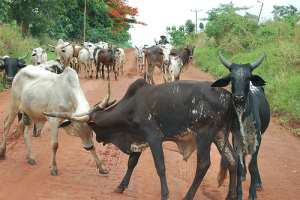
The presence of Nomadic herdsmen in the country continue to pose a serious threat to the implementation of the Community Resource Management Areas (CREMA) concept in some districts, research has shown.
The research was conducted by Mr Vincent Subbey, an Independent Consultant on the state of the CREMA Concept in the Mamprugu Moaduri District in the Northern Region and the Bulisa South District in the Upper East Region.
It revealed that Fulani nomadic herdsmen continue to destroy forest reserves and farmlands where the CREMA Concept was being implemented.
The CREMA is an innovative programme, which empowers communities to manage, protect and preserve natural resources and ensure that they are used effectively.
CREMA aims to equip beneficiaries with evidence-based information and mobilise support from stakeholders such as chiefs, landlords, opinion leaders, women groups and the youth to prevent bushfires and deforestation among other things.
The project also offers a platform for local government authority and communities to interact and devise strategies to achieve maximum benefits from natural resources to enhance community development.
The study was sponsored by the USAID ADVANCE and shared with stakeholders at different forums in the Upper East Region.
The two month study, from September to October 2017, had farmer groups, CREMA society, personnel of the Department of Agriculture, district assemblies, the Police, Forest Service Division and the Wild Life Division of the Forestry Commission, Community Resource Management Committee, women and youth groups among others as respondents in the data collection.
The Study recommended that effective measures should be implemented to deal with the challenges brought by the nomadic herdsmen in order to preserve forests and farmlands.
It said chiefs and elders must be integrated into the CREMA governance structure and made to spearhead the implementation processes in the communities.
Lack of knowledge and poor CREMA structures, the study indicated, were other causes of the poor implementation of the concept.
Others include limited capacity building of CREMA guards, unsustainable exploitation of natural resource products (NRPs) and poorly developed NRP value chains, among others.
It called for effective sensitisation, capacity building and input support through partnerships of CREMA society with identified key stakeholders and support from institutions to help address the challenges.




 We’ll protect state wealth from opaque deals – Prof Jane Naana
We’ll protect state wealth from opaque deals – Prof Jane Naana
 Mauritania president says running for second term in June polls
Mauritania president says running for second term in June polls
 I won't ever say I was a mere driver’s mate' — Prof. Opoku-Agyemang
I won't ever say I was a mere driver’s mate' — Prof. Opoku-Agyemang
 2024 polls: 'EC struggling to defend credibility'— Prof. Opoku-Agyemang
2024 polls: 'EC struggling to defend credibility'— Prof. Opoku-Agyemang
 Akufo-Addo gov't's 'greed, unbridled arrogance, unrestrained impunity, sheer dis...
Akufo-Addo gov't's 'greed, unbridled arrogance, unrestrained impunity, sheer dis...
 Election 2024: Ghana needs an urgent reset, a leadership that is inspiring – Ma...
Election 2024: Ghana needs an urgent reset, a leadership that is inspiring – Ma...
 Partner NDC to rollout a future of limitless prospects – Prof Jane Naana Opoku-A...
Partner NDC to rollout a future of limitless prospects – Prof Jane Naana Opoku-A...
 NPP will remain in gov’t till Jesus comes — Diana Asamoah
NPP will remain in gov’t till Jesus comes — Diana Asamoah
 Sunyani Technical University demands apology from former SRC president over sex-...
Sunyani Technical University demands apology from former SRC president over sex-...
 'Dumsor' was resolved by Mahama but ‘incompetent' Akufo-Addo has destroyed the g...
'Dumsor' was resolved by Mahama but ‘incompetent' Akufo-Addo has destroyed the g...
